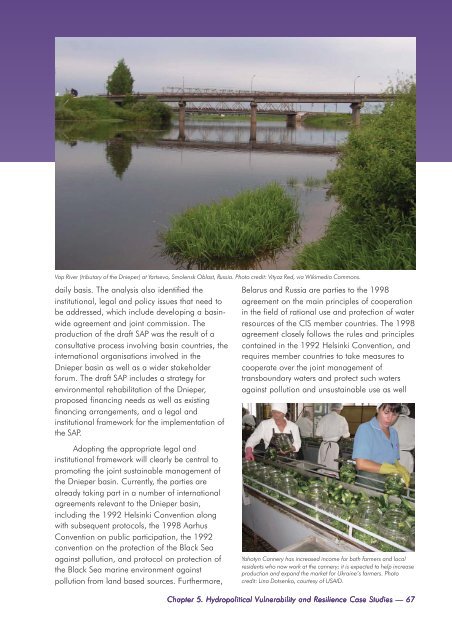Europe - UNEP
Europe - UNEP
Europe - UNEP
Create successful ePaper yourself
Turn your PDF publications into a flip-book with our unique Google optimized e-Paper software.
Vop River (tributary of the Dnieper) at Yartsevo, Smolensk Oblast, Russia. Photo credit: Vityaz Red, via Wikimedia Commons.<br />
daily basis. The analysis also identified the<br />
institutional, legal and policy issues that need to<br />
be addressed, which include developing a basinwide<br />
agreement and joint commission. The<br />
production of the draft SAP was the result of a<br />
consultative process involving basin countries, the<br />
international organisations involved in the<br />
Dnieper basin as well as a wider stakeholder<br />
forum. The draft SAP includes a strategy for<br />
environmental rehabilitation of the Dnieper,<br />
proposed financing needs as well as existing<br />
financing arrangements, and a legal and<br />
institutional framework for the implementation of<br />
the SAP.<br />
Adopting the appropriate legal and<br />
institutional framework will clearly be central to<br />
promoting the joint sustainable management of<br />
the Dnieper basin. Currently, the parties are<br />
already taking part in a number of international<br />
agreements relevant to the Dnieper basin,<br />
including the 1992 Helsinki Convention along<br />
with subsequent protocols, the 1998 Aarhus<br />
Convention on public participation, the 1992<br />
convention on the protection of the Black Sea<br />
against pollution, and protocol on protection of<br />
the Black Sea marine environment against<br />
pollution from land based sources. Furthermore,<br />
Belarus and Russia are parties to the 1998<br />
agreement on the main principles of cooperation<br />
in the field of rational use and protection of water<br />
resources of the CIS member countries. The 1998<br />
agreement closely follows the rules and principles<br />
contained in the 1992 Helsinki Convention, and<br />
requires member countries to take measures to<br />
cooperate over the joint management of<br />
transboundary waters and protect such waters<br />
against pollution and unsustainable use as well<br />
Yahotyn Cannery has increased income for both farmers and local<br />
residents who now work at the cannery; it is expected to help increase<br />
production and expand the market for Ukraine’s farmers. Photo<br />
credit: Lina Dotsenko, courtesy of USAID.<br />
Chapter 5. Hydropolitical Vulnerability and Resilience Case Studies — 67
















